Matt Rees's Blog - Posts Tagged "benjamin-netanyahu"
New meaning to Israel 'domestic issues'
 Billions of dollars in aid, bulging frequent-flier accounts for U.S. diplomats, and several thousand dead ought to be proof enough that the Middle East peace process has churned through the last decade and a half without getting anywhere.
Billions of dollars in aid, bulging frequent-flier accounts for U.S. diplomats, and several thousand dead ought to be proof enough that the Middle East peace process has churned through the last decade and a half without getting anywhere.But if you need more evidence, here it is: The Israeli Prime Minister’s wife is still allegedly yelling at her housekeeper.
When I first came to Jerusalem in 1996, Benjamin Netanyahu had just been elected to lead Israel for the first time. The Oslo Peace Process had been derailed by the assassination of Prime Minister Yitzhak Rabin and a spate of Hamas suicide bombings. And all was not, apparently, well in the Netanyahu home.
One of the first articles I wrote was for a British tabloid, The Daily Mail. It told the sad tale of a young South African girl who alleged that Netanyahu’s wife, Sara, screamed at her for burning some soup, and that this was part of a long process of verbal abuse during her six months of employment. Another former nanny emerged to allege that she had been half-starved while working for the Netanyahus, being allowed one tomato a day and an egg every two days.
Fast forward to the second term of Bibi, as he’s known, now approaching the end of its first year. The Prime Minister has pulled the wool over the eyes of the White House with a tendentious promise to freeze building in Israeli settlements. Things are quiet in the West Bank, thanks to Palestinian complacency and large amounts of U.S. aid.
But they are not so quiet in Netanyahu’s swank villa in Caesarea, an ancient town on the Mediterranean coast and home to many of Israel’s richest people. (It has the country’s only golf course. Say no more.)
Lilian Peretz, 44, filed a lawsuit in the Tel Aviv Labor Court last week alleging that she was frequently humiliated by Sara Netanyahu. The suit claims Sara commanded Peretz to shower several times a day to maintain a “sterile” environment in the villa and would call her with complaints at all hours — once phoning her at 2 a.m. to tell her a pillow had been incorrectly covered.
Peretz claims she was paid below minimum wage throughout her six years with the Netanyahus and was forced to work on the Jewish Sabbath, despite being a religiously observant Jew. The family’s bottled water was barred to her, so she had to make do with drinking from a faucet.
Her suit demands $80,000 in compensation, back pay and emotional damages.
The Prime Minister’s office said this week the lawsuit was “full of lies and defamation,” and that it was part of a campaign by Netanyahu’s political rivals to turn attention from his politics (which he thinks are rather successful) to his lifestyle (which, as a man with two homes and a penchant for cigars, is rather more luxurious than that of the average Israeli voter.)
The Israeli public first heard about the suit in a screamingly large front-page headline in the country’s biggest newspaper. “Sara abused me, humiliated and exploited me,” the Yediot Aharonoth newspaper announced in revealing Peretz’s allegations earlier this month.
The legal content of the suit is perhaps less interesting to most Israelis than its allegation that Sara is a little unbalanced and that she shouts down her staff, the prime minister’s staff and Bibi himself daily. According to Peretz, Sara refers to herself as “the mother of the nation.”
Last week, Peretz complained to her local police station that she had received a threatening phone call from a man who told her to “end this whole thing in 12 hours, [or:] you will be harmed personally. This comes from Bibi.”
The prime minister’s office said the call certainly didn’t come from Bibi.
During Netanyahu’s first term, his family life was often in the news. Sara, a former flight attendant who is now a psychologist, was accused by former staffers of abusing them and of excessive demands for cleanliness in handling the couple’s two sons.
In his years out of office, Netanyahu says privately, he learned many lessons about how to handle leaks from his cabinet and the demands of squabbling politicians. Until last week, he’d also learned how to keep a lid on potential controversy surrounding his third wife.
But Israeli politics is always more complex than it looks. In this case, the relentless promotion of Peretz’s case by Yediot may have more than just a bit to do with a fierce circulation war the newspaper is fighting with a free daily that backs Netanyahu.
Certainly it’s an opportunity for those who oppose the prime minister’s policies to get in a jab or two. In the Maariv newspaper, columnist Ben Caspit wrote that Bibi ought to resign.
“The fact that he permits that problematic woman [Sara:] to decide, to appoint, to fire, to upset, to dictate and to apply pressure on organizations in their entirety renders him unfit” for office, Caspit wrote.
The criticism of Netanyahu is somewhat disproportionate, given the manner in which Israeli politics is generally conducted — it’s riven with corruption, egotism and public speeches which are little more than grandiose hissy-fits. If Caspit thinks the behavior of a politico’s wife disqualifies him from the public’s trust, perhaps he hasn’t looked at how Israel’s politicians behave. That’s the real unbecoming conduct.
I posted this on Global Post.
Published on January 25, 2010 09:32
•
Tags:
benjamin-netanyahu, caesarea-jerusalem, hamas, israeli-media, israeli-politics, lawsuit, nanny, netanyahu, sara-netanyahu, the-daily-mail, yediot-aharonoth, yitzhak-rabin
The war Israelis and Palestinians plan
 I posted this on Global Post. JERUSALEM — There’s an old Arab aphorism: “A man with a plan takes action; a man with two plans gets confused.” Apply that to the Israelis and to the Palestinians, and the nonsensical sequence of recent events in the Middle East starts to fall into a comprehensible pattern.
I posted this on Global Post. JERUSALEM — There’s an old Arab aphorism: “A man with a plan takes action; a man with two plans gets confused.” Apply that to the Israelis and to the Palestinians, and the nonsensical sequence of recent events in the Middle East starts to fall into a comprehensible pattern.It’s not a pleasant pattern, because it leads to war.
First, before we get to the fireworks, let’s recap all the nonsense.
The Palestinians refused to talk to the Israelis from December 2008, when a relatively centrist Israeli government made a peace offer the Palestinians rejected. Since then, small economic reforms and big U.S. security aid have made life in the West Bank fairly free of violence. Better, for sure, than life in Gaza, which is still a mess more than a year after the Hamas-Israel war there.
Israelis elected a center-right-dominated parliament a year ago, and Benjamin Netanyahu formed a rightist cabinet. He refused to halt building in Israel’s West Bank settlements, as President Barack Obama demanded. Even when forced by Washington to put a transparently fake freeze on construction he declined to include East Jerusalem.
The Palestinians wouldn’t restart direct peace talks until there was a freeze on the Israeli neighborhoods of East Jerusalem. So the Americans eventually persuaded them to have indirect talks. Without much enthusiasm, the Palestinians agreed.
Why no enthusiasm? Leading Palestinians, including chief negotiator Saeb Erekat, had already started to talk about a new failed round of talks leading quite simply to a “one-state solution.” That means, no division of the land, just a single state in what’s now Israel, the West Bank and Gaza. One adult, one vote. Soon enough, of course, that means no Jewish majority and the end of Israel as a Jewish state.
Meanwhile, Israel largely escaped the financial crisis of the last two years and its citizens spend little time fretting about the Palestinians. In Tel Aviv, the discovery of old bones by workers building an underground emergency room for a hospital led last month to an attempt by ultra-religious politicians to block the construction, and protests by locals who cried out against religious coercion.
No such mass protests against continued building in the settlements. That proceeds, even to the extent that during the last month announcements of new construction in East Jerusalem have caused a major crisis in relations with Washington. In one case, the planned building of a mere 20 apartments in an Arab neighborhood of East Jerusalem forced Obama to take time out of his undoubtedly busy day to discuss it with Netanyahu.
There’s more nonsense, but let this much suffice for now.
Back to the Arab aphorism. Who has a plan, and who’s confused?
It’s clear that most Israelis and most Palestinians are living in denial — a kind of confusion, because it takes the illusion of current calm for a sustainable and welcome period of peace.
Israelis know the settlements can’t go alongside a two-state solution, but they don’t choose one or the other.
Palestinians know that the way to stop the settlements eating up the hilltops around their towns is to strike a deal now and rule their own state, but they won’t do it so long as life is relatively good and the international pressure is all on Israel. Leaders of Fatah and Hamas have called for a “third intifada” several times in the last four months — not for renewed talks, only for renewed violence. But a mere handful of kids came out to throw rocks and Molotov cocktails.
With no sense of urgency on either side, Western diplomats shake their heads and try to nudge the two nations to the negotiating table. It’s time to realize that neither side wants talks.
While most Israelis live in denial, a sizeable minority pushes for more building in the West Bank and East Jerusalem. They’re not building so that they can later give up that land and see all the money they’ve pumped into their real estate wasted. The purpose is to make the West Bank inseparable from Israel. To kill the two-state solution.
In that scenario, either the Palestinians agree to be second-class inhabitants of the area -- fat chance -- or they leave. Well, with a little nudge.
On the Palestinian side, negotiations seem unlikely to lead to the satisfaction of every single demand. So the one-state solution starts to look good to them, too. However, second-class citizenship isn’t an option, and neither is leaving.
That’s the collision course Western diplomats refuse to countenance. When envoys talk about getting the “peace process on track,” it sounds good. But that process has been trucking along since the early 1990s. Peace has been getting further away. The “process” allows for a sense of activity, while all the time events — settlement construction, terror attacks — make it harder to draw lines on a map and make the populations secure.
It’s time to figure out a new diplomatic strategy to deal with the Israelis and Palestinians. One that’s based on the assumption that, in the longterm, they’re expecting war.
Published on April 06, 2010 02:02
•
Tags:
arab, barack-obama, benjamin-netanyahu, conflict, crime-fiction, east-jerusalem, fatah, gaza, global-post, hamas, intifada, islam, israel, israelis, jerusalem, jews, journalism, middle-east, palestine, palestinians, settlements, tel-aviv, war
Bibi's Bedtime Book: The Secret Diary of Prime Minister Netanyahu
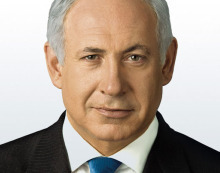 No Palestinian state this week. Don’t really know why not. At this point I’d be happy to sign off on anything at all, just to get it off my hands. I’ve told the Americans that, but they seem convinced I’m some kind of hardliner—they think I’m bluffing when I say “Barry, where do I sign?” I think it’s because of the way I lift my eyebrow in my official photograph. I thought it was sexy and devil-may-care, but apparently it makes me look hawkish and too clever for my own good.
No Palestinian state this week. Don’t really know why not. At this point I’d be happy to sign off on anything at all, just to get it off my hands. I’ve told the Americans that, but they seem convinced I’m some kind of hardliner—they think I’m bluffing when I say “Barry, where do I sign?” I think it’s because of the way I lift my eyebrow in my official photograph. I thought it was sexy and devil-may-care, but apparently it makes me look hawkish and too clever for my own good.It’s been Passover here in Israel. I’ve had to smile and shovel down the usual seasonal foods. I even had to sit through a seder. We were slaves in Egypt, etc., on and on for six hours. You’d have thought we’d be done with all that now. It’s like Zionism never happened.
I gather they had a seder at the White House, too. Without me. Maybe I’ll have Kwanzaa at my villa in Caesarea this year and I pointedly won’t invite Obama. On second thoughts, the rabbis wouldn’t like it. They don’t like holidays where you sing in tune – strictly tuneless, out of time, Jewish mumble-singing is more their thing.
I went down to Shaul’s Shawarma stand to mix with the people. Mofaz insists on meeting there – he set the place up as something to fall back on if he doesn’t get to be Prime Minister instead of me; he could retire, stop wearing his colorless rep ties, and instead bore all his customers with stories of how his political career was a victim of the Ashkenazi establishment. He served me some kind of stinking horsemeat impacted under high pressure into a block so that it looked like an actual cut of meat. I called him “my brother,” which is how Israelis who aren't from the Ashkenazi elite like to refer to each other, and went off to find a breath mint. I suppose he thought the joke was on me.
I’ll eat anything, provided someone else is paying, of course. That’s why I got into politics. Even when I wasn’t in office, at the end of a meal, I’d pat my jacket and say, “Sara, did you bring my wallet?” And some guy from Los Angeles would always reach out and say, “No, no, Mister Prime Minister, let me.”
Why do they say “Mister Prime Minister?” Or Mister President? These are nouns, aren’t they? You don’t call the man who fixes your toilet “Mister Plumber.” On the occasions when I’ve met this Rees fellow I didn’t call him “Mister Writer.” It’s not even necessary for my wife to call me “Mister Big Shot” when she’s upset with me. “Big Shot” would do. I suppose “Mister” adds a grace note to her sarcasm.
Mainly such things are all about self-aggrandizement. Still, just so long as they pick up the tab for my steak and lobster, I’ll let it slide.
Talking of self-aggrandizement, Defense Minister Napoleon puffed out his little chest and humiliated the head of the army this week. Something silly to do with not extending the chief of staff’s term because he didn’t kiss up (figuratively, because in reality everybody would have to bend down to kiss that shortass). Perhaps he’d neglected to call him “Mister Defense Minister.” Or “Mister Bonaparte.” Or “My Emperor.”
Anyway, someone else’s troubles are usually a sign that someone’s too busy elsewhere to ruin my week. So it’s good news. I’ve barely been in the headlines all Passover.
Why am I shy of the press? I keep getting slated for being a hardliner, that’s why. Yet it’s little Napoleon who flattened Gaza and ballsed up the “peace process” a decade ago. I thought we were rid of him once he got onto the $50,000 a night speaking tour in the US. I suppose he had to come back for a while to keep in the public eye, then in a few years he can be President, which isn’t a real job (though I haven’t told Peres that.)
No, I don’t understand the press. Take that fellow Matt Beynon Rees. He came to my office a while back and smoked one of my long Cubans. I told him about my interpretation of the work of Emmanuel Kant, but all he wrote about in the end was a few things I’d said about building in our settlements in Judea and Samaria.
I gather Rees also concluded that journalism is a waste of time. He’s writing fiction now. Crime novels about a Palestinian detective. I must take a look at them. I gather my pal Arafat doesn’t come out too well in one of them called “The Samaritan’s Secret”. A shame. I’m rather fond of the sneaky old “ra’is”, of blessed memory.
Maybe I’ll give it all up and write some fiction myself. About an Israeli Prime Minister who’s misunderstood, who only wants to make people happy and give everyone he talks to exactly what they want. A state for the Palestinians. More ritual baths for the ultra-Orthodox. A free Mazda for the 6 percent of Israelis who don’t already own one. The Legion d’Honneur for the Imperial Defense Minister.
Yes, I might just write a book like that. I think it’d be a good read.
But no one would believe it.
[Prime Minister Netanyahu will be continuing to disclose his most secret thoughts exclusively on this blog].
Published on April 08, 2010 01:12
•
Tags:
barack-obama, benjamin-netanyahu, bibi-s-bedtime-book, crime-fiction, ehud-barak, israel, israeli-politics, israelis, matt-rees, palestine, palestinians, shaul-mofaz, the-samaritan-s-secret
A who's who of Israeli corruption
 In a small country you can find all the important decision-makers sweating in one gym.
In a small country you can find all the important decision-makers sweating in one gym. JERUSALEM — The heads of all the crime families in New York used to get together every Wednesday night at the Ravenite Social Club on Mulberry Street in Little Italy. If you were looking for an Israeli parallel, you could do worse than the gym I work out at.
The Cybex Club at the David’s Citadel Hotel has a nice view of the Ottoman walls of Jerusalem’s Old City. It’s also where the legal, political and business elite come to sweat (actually, being Israelis, they spend as much time talking as they do exercising). As I labor through my sit-ups, I’m surrounded by prime ministers, ministers, night club owners and restauranteurs, private detectives — all of them either under investigation, out on parole or formerly the targets of corruption probes.
The latest member of the Cybex cabal to hit the headlines is Uri Messer, who was arrested this week on charges of serving as an intermediary in an alleged bribery scheme. One leg of the alleged scheme is a former Cybex jock, ex-Prime Minister Ehud Olmert. (The manager used to open the gym half an hour early in the morning so Olmert could run 10 kilometers on the treadmill before 7 a.m.)
The gym is instructive, because it puts Israel into perspective. What you see of Israel on the news makes the place seem so central to world politics that it’s easy to forget what a tiny country it is — not just geographically, but also socially. Maybe there’s a gym or a bar in some of the smaller U.S. states where you might see pretty much everyone who counts in the decision-making of that region. But on a national level, there’s no such place. Washington’s just too big.
In Israel, a handful of places provide a social nexus for the elite, funneling the influence and connections that dominate a $200 billion economy, and Cybex is one of them. (Vermont, by contrast, is a $27 billion economy, one of 26 U.S. states with a smaller economy than Israel.)
Messer, a close friend of Olmert, admitted a couple of years ago to keeping a slush fund of hundreds of dollars in cash in a safe for then-Prime Minister Olmert. This time he’s charged with facilitating a bribery scheme to circumvent planning restrictions in Jerusalem.
The judges in Olmert’s corruption trial are currently deciding how to rearrange forthcoming hearings, given the new evidence surrounding Messer. The former prime minister already faces trial on three separate corruption investigations and is charged on counts of aggravated fraud, fraud, falsifying documents and tax evasion.
From my window I look across the valley at the result of this latest alleged bribery scandal: the Holyland complex, a weird Lego creation of apartments strung along a ridge with a 15-story tower beside it. Every committee and planning group in the city hated the idea, but it went ahead.
Now maybe we know why.
Well, Israelis knew all along. They understand the size of their economy is and how a relatively small group of men manages to maintain a hold on the profits. They also know that construction — fueled by rich American and French Jews who buy with their hearts, rather than their heads, for a sentimental foothold in Israel that they occupy for a few weeks a year — has been the easiest source of such profits. And the one most susceptible to corruption.
How pervasive is that corruption? Look at who else is implicated in the probe that snared Messer. The former municipal engineer for Jerusalem, Uri Sheetrit, at first opposed the Holyland project. Then he became a big proponent. What changed his mind? The police think they know. They’ve remanded him for a week.
It all struck me long before these allegations came out against Messer. You might say it’s instinctive to recognize it once you observe how the place works. This is a country where the average wage is $2,000 a month and a BMW costs $300,000 including taxes. The parking lot at the David’s Citadel was always full of BMWs, and I simply assumed such money was unlikely to be entirely licit. There wasn’t even the chance that these were bankers — which would make them unsavory but, grudgingly, legal earners — because Israel’s financial center is in Tel Aviv.
Then one day my Russian personal trainer was stretching my pectorals and whispering about the other people who happened to be in the gym at that moment. Given that it wasn’t very crowded, it was quite a list:
“That guy’s a private detective. He just got out of jail for blackmailing someone. That’s one of the two owners of the club I go to on Fridays. He’s been to jail for tax evasion. That guy owns a restaurant and all his partners went to jail for tax evasion.”
“Who? That guy?”
“No, the one next to him. The one you’re referring to owns a different restaurant. He actually was jailed for tax evasion. That woman was the education minister — clean, as far as I know. That guy’s Uri Messer.”
“The little guy with the gray beard who keeps waving to everyone?”
“Yeah, him. On the treadmill. He’s tight with Olmert.”
My trainer didn’t need to introduce the other man, walking on the treadmill with his half-glasses on the end of his nose and his head bent to a sheaf of papers. It was Prime Minister Benjamin Netanyahu.
Published on April 11, 2010 05:21
•
Tags:
benjamin-netanyahu, bribery, corruption, crime-fiction, cybex-gym, david-s-citadel-hotel, ehud-olmert, fraud, gym, holyland, israel, jerusalem, little-italy, mafia, middle-east, new-york, ravenite-social-club, uri-messer, vermont
All talk, no two states
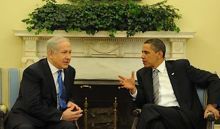
At his White House press conference with Israeli Prime Minister Benjamin Netanyahu this week, United States President Barack Obama enthused that the talks about talks will probably lead to talks, and his assessment was that the Israeli government is ready to take part in those talks.
As the camera shutters clicked and the Israeli prime minister cocked his eyebrow in the way he favors when trying to look smarter than everyone else in the room, the most powerful man in the room said: “We expect proximity talks to lead to direct talks, and I believe that the government of Israel is prepared to engage in such direct talks.”
If that sounds like a lot of nothing, that’s because underlying all the talking about talks there’s a growing sense that none of it will ever lead anywhere. Anywhere good that is. The talks are supposed to be about what’s known as the “two-state solution,” in which the land of Israel, the West Bank and Gaza is divided into a state for Israel and a state for the Palestinians.
More and more Israelis and Palestinians, however, acknowledge (or fear) that it’s too late to effectively divide the land as the Israeli and Palestinian populations grow and merge geographically. All the talking about talks and the climate of fear in both nations’ polities delays the chance of a final deal. That, in turn, allows changes on the ground to make a two-state solution still further away.
“The two-state solution is really not an option anymore,” said Gideon Levy, a columnist for the Israeli newspaper Ha’aretz and author of a new book of essays about the Palestinians called “The Punishment of Gaza.”
“It’s on its last legs,” he said.
Read the rest of this post on my blog The Man of Twists and Turns.
Published on July 09, 2010 06:40
•
Tags:
barack-obama, benjamin-netanyahu, gaza, gideon-levy, hamas, hebrew-university, israel, jews, mahmoud-abbas, palestinians, peace-talks, sergio-della-pergola, settlements, two-state-solution, united-states, west-bank
Tragic friends on a search for peace
 JERUSALEM—If you asked about a moment that encapsulates the tragedy of the Israelis and Palestinians, there’d be no shortage of incidents, fatal and wrathful, from which to choose. This week, however, I’d point out an occasion that was less shocking but just as poignant.
JERUSALEM—If you asked about a moment that encapsulates the tragedy of the Israelis and Palestinians, there’d be no shortage of incidents, fatal and wrathful, from which to choose. This week, however, I’d point out an occasion that was less shocking but just as poignant.In a banquet hall of the King David Hotel, an Israeli leader and a Palestinian leader came to the podium together Sunday evening. They embraced, spoke of each other as good friends and talked of the breakthroughs they made in the peace talks they shared. The audience applauded warmly and a benign smile made its way to the faces of almost everyone in the room.
Why is this a tragedy? Because former Israeli Foreign Minister Tzipi Livni and Ahmed Qurei, a member of the Palestine Liberation Organization’s Executive Committee, failed to make a peace deal.
The two were prime negotiators at regular meetings in the King David Hotel during 2007 and 2008 in what became known as the Annapolis Process — for a conference held in late 2007 at the U.S. Naval Academy in Annapolis, Maryland. The talks got even closer to a resolution of the conflict than the Camp David summit of 2000. In the end, Livni’s boss, Prime Minister Ehud Olmert, said that he made a wide-ranging offer to Palestinian President Mahmoud Abbas in 2008, never heard back and subsequently had to resign because of corruption investigations.
Since then talks have been at an impasse.
As Livni and Qurei reminisced affably about their near miss, I had two impressions. The first was that they had done a pretty good job of hiding how they really felt back when the negotiations were going on. Things in the region looked quite bad then. Israel fought a war with Hezbollah in Lebanon in 2006 and launched an attack on Hamas in Gaza at the end of 2008. Palestinians complained about building in Israeli settlements and, of course, fought a low-grade civil war between Hamas and Fatah.
The second important impression was that these two had really made a kind of personal peace. To differing degrees, they had gotten past the victimhood mentality that prevents either side from progressing. Yet they still hadn’t been able to hash out a deal, face to face across a table in a hotel (a very nice hotel, incidentally, where a basic room is $400 a night.)
In that case, what chance do peace talks now have?
Read the rest of this post on my blog The Man of Twists and Turns.
Published on July 17, 2010 09:56
•
Tags:
ahmed-qurei, annapolis-process, avigdor-lieberman, benjamin-netanyahu, ehud-olmert, fatah, gaza, hamas, hezbollah, intifada, israel, israelis, khalil-shikaki, king-david-hotel, lebanon, mahmoud-abbas, maryland, middle-east, palestine, palestinian, sarb-erekat, tzipi-livni, u-s-naval-academy
Israeli settlements: frozen, still cooking
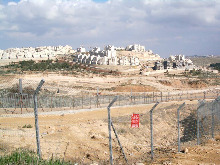 JERUSALEM — Palestinian negotiators said again this week they’d refuse to re-enter direct peace talks with Israel unless the current partial freeze on construction in Israeli settlements is extended when its term runs out in September.
JERUSALEM — Palestinian negotiators said again this week they’d refuse to re-enter direct peace talks with Israel unless the current partial freeze on construction in Israeli settlements is extended when its term runs out in September.But as a report released this week by the Israeli human-rights organization B’Tselem reveals, a real settlement freeze would have to be a very, very big chill.
B’Tselem’s report, called “By Hook or By Crook: Israeli Settlement Policy in the West Bank,” documents the massive scope of Israel’s settlement operation. It says that hundreds of millions of dollars are being paid to settlers, real estate developers and settlement municipalities as incentives to expand the settlements. It also highlights the manner in which every layer of Israeli bureaucracy continues to be involved in an expansion project that successive Israeli governments have pledged in international forums to halt.
For the human rights group, the issue is not political. Jessica Montell, B’Tselem’s executive director, said that the inequality of life in the West Bank — rather good if you’re an Israeli and pretty bad if you’re Palestinian — is the most objectionable upshot of the settlements, which she adds are illegal under international law.
“In the West Bank, your rights are based on your nationality,” she said.
Read the rest of this post on my blog The Man of Twists and Turns.
Published on July 23, 2010 22:03
•
Tags:
b-tselem, benjamin-netanyahu, east-jerusalem, george-w-bush, human-rights, israel, israeli, jessica-montell, middle-east, palestine, palestinian, road-map, settlement-freeze, settlements, tel-aviv, west-bank
With democracy like this, who needs dictators?
 JERUSALEM — Israelis like to point out that theirs is the only democracy in a Middle East otherwise dominated by repressive regimes. Given the performance of legislators in the parliamentary session that just ended here, you might be forgiven for asking: with democracy like this, who needs dictators?
JERUSALEM — Israelis like to point out that theirs is the only democracy in a Middle East otherwise dominated by repressive regimes. Given the performance of legislators in the parliamentary session that just ended here, you might be forgiven for asking: with democracy like this, who needs dictators?The Knesset, Israel’s parliament, broke up last week for its summer vacation. The speaker of the Knesset, Reuven Rivlin, sent lawmakers on their way with an interview in an Israeli newspaper in which he described them as “pathetic.” Several human rights organizations slammed as dangerous to democracy more than a dozen bills that passed preliminary readings. The most abiding image of the session was surely the gang of right-wing legislators heckling and threatening a female Arab parliamentarian who had been aboard a Turkish ship intercepted by Israeli commandos en route for Gaza.
In a letter to Israeli Prime Minister Benjamin Netanyahu last week, Debbie Gild-Hayo, director of policy advocacy at the Association for Civil Rights in Israel, complained of “14 dangerous draft bills” introduced to the departing parliament.
“The Knesset is supposed to be a bastion of democracy,” Gild-Hayo wrote. “It seems an increasing number of Members of Knesset believe that their job is to silence those who do not share their views.”
The most headlines were devoted to a confrontation between conservative legislators and Haneen Zoabi, the female Arab lawmaker. Zoabi was aboard one of the Turkish boats intercepted May 31 by Israeli troops, which resulted in nine dead among the activists on board. They were protesting the Israeli blockade of Gaza by trying to run it.
The Knesset voted two weeks ago to suspend Zoabi some parliamentary privileges. She called this an act of “revenge” for her participation in the seaborne protest. A right-wing Israeli lawmaker brandished an enlarged facsimile of an Iranian passport with Zoabi’s photo in it. (Zoabi has suggested that Iran should have nuclear weapons to balance Israel’s arsenal.)
Read the rest of this post on my blog The Man of Twists and Turns.
Published on August 01, 2010 05:38
•
Tags:
arab, benjamin-netanyahu, gaza, haneen-zoabi, israel, israel-our-home, jerusalem, jew, knesset, middle-east, politics, reuven-rivlin, turkish-flotilla, west-bank
Israeli leaders pass buck
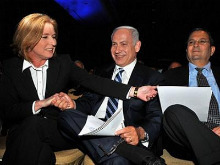 The present Israeli government seems to make a specialty of dropping the ball. The only thing the top ministers won’t drop is the buck. They’re very adept at passing that.
The present Israeli government seems to make a specialty of dropping the ball. The only thing the top ministers won’t drop is the buck. They’re very adept at passing that.Testimony last week revealed the lack of responsibility at the top of the Israeli government. Before a committee investigating a fouled up military operation, Prime Minister Benjamin Netanyahu and Defense Minister Ehud Barak have both said they take responsibility for the attempted takeover of a Turkish boat May 31 which left nine of the protesters aboard dead. Of course, they immediately added that “taking responsibility” doesn’t mean they were actually “responsible” for what happened.
That was someone else.
Netanyahu said it was Barak’s fault. Barak said it was the army’s fault, and also Netanyahu’s fault. On Aug. 11, the army chief of staff, Gabi Ashkenazi, testified. He said he “takes responsibility” for the operation, and then argued that it wasn’t a failure. In fact he was “proud” of the soldiers who took control of the boat, which was steaming toward Gaza to break the Israeli blockade.
So that’s all cleared up then. Nobody was responsible for the failures of the raid. But the raid was also a good thing. Even if it did result in the broadest international vilification of Israel for some years.
Even the leader of the opposition, Tzipi Livni, says she wants to testify before the committee to “take responsibility” for the Gaza blockade, which was initiated while she was foreign minister in the previous government. The policy is good, she says, but Netanyahu isn’t running it correctly, which makes it look bad. So her taking of responsibility is also just a way of showing that someone else is responsible for the thing no one wants to take responsibility for.
When there’s so much talk of responsibility, it usually means somebody must have done something very irresponsible.
Read the rest of this post on my blog at The Man of Twists and Turns.
Published on August 16, 2010 01:29
•
Tags:
benjamin-netanyahu, ehud-barak, eiland-report, gabi-ashkenazi, gaza, israel, mavi-marmara, middle-east, palestinians, turkish-flotilla, tzipi-livni
Israel's president is no angel
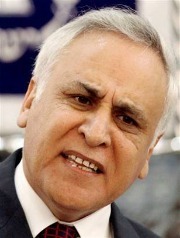 When the residents of Kiryat Malakhi, the southern Israeli town whose name means “City of Angels,” picked Moshe Katsav as the youngest-ever mayor in the country’s history in 1970, he was 24. For decades he was the town’s symbol, an immigrant born in Iran who made it to the top of the establishment and was elected Israel's president in 2000.
When the residents of Kiryat Malakhi, the southern Israeli town whose name means “City of Angels,” picked Moshe Katsav as the youngest-ever mayor in the country’s history in 1970, he was 24. For decades he was the town’s symbol, an immigrant born in Iran who made it to the top of the establishment and was elected Israel's president in 2000.Now it has been proven that they picked the wrong man.
Far from being an angel, Katsav stands convicted of two counts of rape and of other counts of sexual harassment and obstruction of justice. Tel Aviv District Court judges said Thursday that Katsav had “excelled in manipulation and withholding information” during his trial.
Katsav was found guilty of twice raping a woman who worked for him when he was tourism minister a decade and a half ago. He was also convicted of sexually abusing and harassing two women who worked for him at the president’s residence.
Beyond the ugliness of his crimes, the hubris of Katsav’s case is immense. It was Katsav who first drew public attention to his sexual misdeeds — to which other politicians had long turned a blind eye — by complaining five years ago to the attorney general that he was being blackmailed by one of the women he now turns out to have abused.
Subsequently, he was offered a controversially lenient plea bargain, according to which he would have escaped prison and accepted conviction on lesser charges than rape. Just as the deal was due to be signed, Katsav rejected it, claiming he would prove his innocence in court. It now appears he had been seduced by his own lies.
When the accusations were first leveled at him, Katsav ranted at length against the media in a rage-filled press conference at the presidential residence. He railed that he was the “victim of a lynching” by the media and the judiciary, because he was an upstart from a poor town whose origins lay in the Muslim world, not among the typical Israeli elite descended from European Jews. This was in spite of the fact that the attorney general who indicted Katsav was born in Tunisia.
The Tel Aviv judges noted the 65-year-old former president’s tactical error, when they highlighted the new evidence that had arisen since the rejection of the plea bargain — evidence which made his conviction all the more certain. Had Katsav accepted the plea deal, he would by now have been a candidate for prime minister. Instead, he could face up to 16 years in jail.
Katsav’s lawyers say he’ll appeal and, in the manner of the long court case so far, unnamed friends have appeared in the Israeli press to say how depressed he is that the court didn’t accept his explanation of events. Some described him as too upset to leave his house for his local synagogue on Friday.
Outside the court, where his father had been required to surrender his passport, Katsav’s son Boaz rejected the verdict: “We will continue to walk with our heads high, so all the nation throughout its generations, with God’s help, will know that father, the eighth president of the State of Israel, is innocent.”
Read the rest of this post on my blog The Man of Twists and Turns.
Published on January 01, 2011 00:43
•
Tags:
benjamin-netanyahu, crime, israel, israeli-president, israelis, jews, kiryat-malakhi, middle-east, moshe-katsav, rape, tel-aviv



